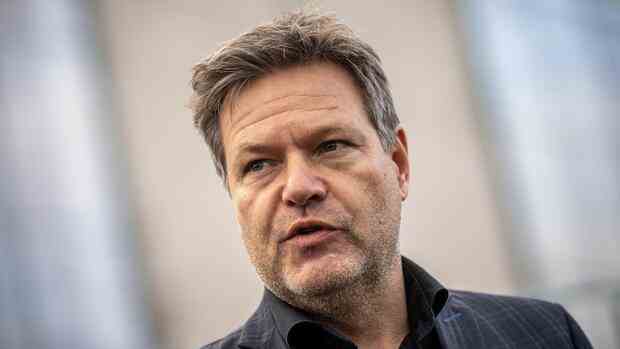The Federal Minister of Economics wants to ensure that the relief from the energy price brakes reaches consumers.
(Photo: dpa)
Berlin Federal Economics Minister Robert Habeck (Greens) warns the energy industry against excessive price increases for electricity and gas. He assumes that everyone will “of course comply with the law and, in the emergency situation we are in, only pass on the prices that are really necessary to consumers,” said Habeck on Sunday. However, if energy suppliers are considering “testing a gray area”, the abuse clause envisaged in the laws on gas and electricity price brakes is certainly a clear instrument to take action against it.
Many suppliers have massively increased the prices for electricity and gas in recent weeks, in some cases by more than 100 percent. Consumer advocates criticize that the increases are not always fully justified by increased procurement costs.
In the law on the electricity price brake, as well as in the law on the gas price brake, there is a regulation that expressly prohibits abusive pricing. The Federal Cartel Office is granted far-reaching rights of access, which are associated with a reversal of the burden of proof: the Cartel Office does not have to prove that abusive pricing has taken place.
Rather, the affected energy supplier must prove that the electricity or gas prices that it charges consumers are justified. To do this, the company must prove the prices at which it bought the gas itself, for example from a power plant operator or a gas importer.
Top jobs of the day
Find the best jobs now and
be notified by email.
The Cartel Office can oblige suppliers to stop abusive behavior or to pay monetary penalties. Economic advantages should be able to be skimmed off. The planned abuse regulations should apply in addition to the instruments of general antitrust and competition law that are already in force.
Energy suppliers should only be able to increase prices if they can actually prove higher procurement costs.
(Photo: dpa)
The Federal Cabinet had adopted the abuse clauses at the end of November with the laws on electricity and gas price brakes. The price brakes are to be passed by the Bundestag and Bundesrat in mid-December.
The incentive to save energy should remain
The core of the regulations: Consumers receive a basic quota of 80 percent of their electricity and gas consumption at capped prices. The electricity price for the basic quota is capped at 40 cents per kilowatt hour, the gas price at 12 cents.
The value of 80 percent is based on the consumption of previous billing periods. The suppliers are reimbursed by the federal government for the difference to the actual prices. For consumption that exceeds the base quota, consumers have to pay the full price themselves. This should create an incentive to save gas and electricity.
The laws are scheduled to come into force on January 1, 2023. The first relief amounts will be credited from March 2023. Then there will also be retrospective relief for the months of January and February 2023. The federal states in particular had pushed for the price brakes to be used as early as January 1st. However, the suppliers had resisted this, since the implementation required deep interventions in IT processes.
>> Read here: Municipal utilities increase prices by up to 110 percent
The energy industry welcomes the ban on abuse. “It must not happen that individual companies take advantage of the crisis,” said the general manager of the Federal Association of Energy and Water Industries (BDEW), Kerstin Andreae. However, it must be ensured “that reasonable adjustments that are permissible under the general rules are still possible”.
Extreme price increases in wholesale presented the suppliers with enormous challenges, explained Andreae. They would have to be able to pass on sharply increased procurement costs to customers.
Experts criticize the provisions, which are intended to prevent abusive pricing. The federal government must be careful not to cause permanent damage to competitive pricing in favor of short-term, politically desired price controls. “This creates more problems in the long term than can be solved in the short term,” said lawyer Jana Michaelis from the law firm Rosin Büdenbender.
Consumer center finds significant price differences
Consumer advocates are convinced that individual suppliers are overshooting the target with their increases. “One or the other provider now sees a good opportunity to increase prices without customers running away from them, because they are reimbursed the full price for 80 percent anyway,” said Christina Wallraf from the NRW consumer advice center.
>> Read here: Gas price brake: who has to pay tax on the savings from the relief
Something like that can only be determined by observing prices over the long term. That would be the task of the antitrust authorities. Wallraf said it was questionable whether they would be able to do this at all given the volume of price increases announced.
The consumer advocates in North Rhine-Westphalia recently took a closer look at the basic supply tariffs for gas in their state. 140 of the approximately 800 German basic suppliers are located in NRW. The result: The price difference between the individual providers is enormous. The lowest basic supplier tariff in NRW currently costs 5.98 cents per kilowatt hour of gas, while the highest costs 28.08 cents.
More: What homeowners can do if the energy supplier gives notice
